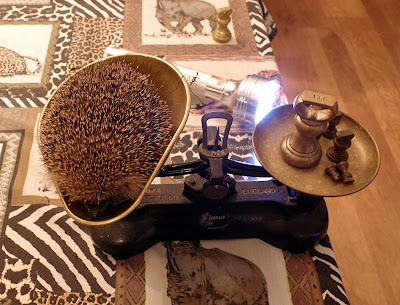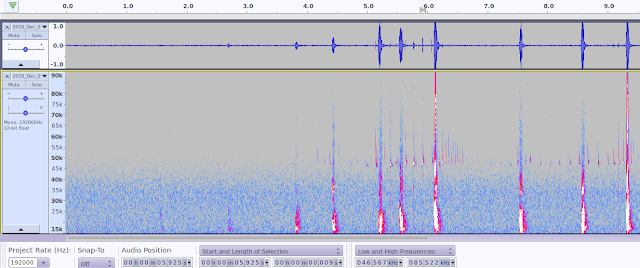I used to think that 'hibernation' meant 'sleeping through the winter' in the sense that an animal went to sleep in November and woke up at the end of March.
Maybe this is why my tortoise died.
I stuck him in a cardboard box when I was 7, and only went back to wake him up in April.
During the summer, we appeared to have two hedgehogs; a small youngster and an adult which we assumed to be its mum. We put out Go-Cat dried cat food every night and the small hog grew steadily. After a few weeks the larger hog disappeared, but the small one continued to appear every night.
hedgehog identification
Let me make it quite clear that I can't tell one hog from another. I went around the loop of thinking of ideas on how to mark or tag them, but came to the conclusion that (i) it wouldn't benefit the hog in any way, (ii) it may even distress the animal or make it easier for a predator to spot, (iii) I didn't really need to know, I could just pretend to know that this was OUR hog.
So in short, its possible that there are many hogs, but this is unlikely. They have been very rare hereabouts for the last few years.
ideal hog weight
Having read somewhere that a hedgehog needs to be at least 500g to survive hibernation, I grabbed our little hog early in November, and put him on the scales.
 |
| The Hog Weigh-in |
He (or she) didn't seem to mind, or at least he didn't hiss at me. He weighed in at 1lb 7.5oz (666g approx) so I was well satisfied that feeding him a small amount of dried cat food every night had paid off. There had been some internal dispute that 20-25 Go-Cat biscuits (about 7g) that I provided each night was not enough. But as I see it, we should only be supplementing the hogs diet, not trying to turn it into a moggy.
However, before you track down your own hogs and weigh them, I have since discovered that everyone seems to have their own ideal hog weight. Some silly people are taking hogs into care if their weight is below 600g. This stresses the hog and can do a lot more harm than good.
So if in doubt, read this advice from the British Hedgehog Preservation Society.
I released him via our new hog box. He was not impressed, and chooses to sleep elsewhere. Wherever he spends the night, I figure its pretty close by, because he generally arrives at the hog feeder soon after dark.
During the last few weeks his visits (as determined by our trail-cam) have been less frequent and irregular. He might not show up for 6 or 7 nights, then, following a mild day, he puts in an appearance.
part-time hibernation
I guess the only reason for hibernation is to conserve energy during the winter, when food is scarce. So I think what this hog is doing amounts to part-time hibernation. While he can find enough food for a net gain (food/effort required) he 'wakes up' and ventures out.
The main problem for us is not knowing where he sleeps. Whenever we don't see him on the trail cam, we don't know if he is sleeping somewhere or has just been turned into a flat road-hog! So in the meantime I just put food in the feeder if he was feeding the night before, or leave the old food there if it remains un-eaten.
hibernating bats
As I had the same 'sleep for the winter' view of bats, I had packed away the tangle of wires that I call my Auto Bat Logger, with the idea that I wouldn't need it until April. But on the Facebook group: "Bat Call Sound Analysis Workshop" I discovered that bat activity does not completely stop during winter. And the "Bats London" project proves this via their 15 auto bat loggers set up around the Queen Elizabeth Olympic Park in London.
So a few days ago, when the forecast did not include any rain, I setup my auto bat logger. Sure enough there were pipistrelles and noctules flying over my garden.
 |
| Both echo & social calls from a winter visiting pipistrelle bat |
Admittedly I only captured 12 recordings, compared to hundreds on a typical summers night, but at least it proves that some individual bats think its worth the effort to hunt during December.
Someone of the Facebook group made the observation that, before the use of auto bat loggers, it was probably the guys walking around with manual bat detectors that were hibernating during the cold winter nights!
No comments:
Post a Comment